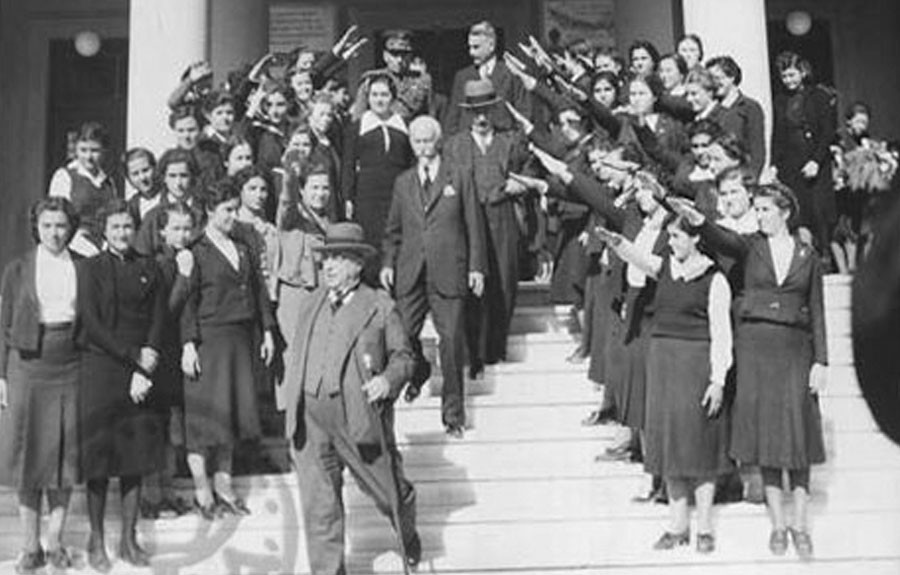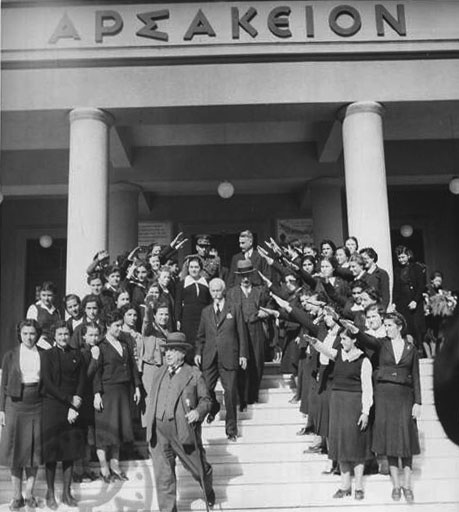
How Others Saw the Metaxas Regime
“The first two years of the Metaxas Regime was a productive one, full of frantic activity regarding domestic social and economic policy, regime security, and external and foreign relations: Greek-British relations, for instance, were crucial. After Metaxas and his regime were taken up more or less completely with the EON (National Youth Organization) and war preparations. And all this time Metaxas himself was plagued by illness”
”There are those who assert the Metaxas represented Fascism in Greece, and impute to his 4th August Regime a Fascist Ideology (…) There was no elaborate background preparation for a Fascist regime; there were hardly any Fascists in Greece before 1936, or at least in any meaningful numbers. Equally, there were hardly any significant, active Fascist organizations. Andrikopoulos himself manages to list only five: The National Union of Greece (Ethniki Enosis Ellados) in Thessaloniki which was patriotic and anti-Semitic; The Greek National Socialist Party of George Merkouris, founded in 1933 as a poor, unsuccessful imitation of the Hitler movement by the son of the ultra-royalist Mayor of Athens, Spyros Merkouris, a close collaborator of King Constantine during the Great War; Iron Peace, a national defense organization led by Colonel Niklambis, an old cohort of the dictator General Pangalos, whose members were mainly cashiered officers of the Pangalos regime; the National-Socialist Party of Macedonia-Thrace, very insignificant and the University Students Club, a national union to counter the strong Communist student organizations in the University of Athens. There was also a small local group of the Italian Fascio. There is no evidence however that Metaxas himself was associated with them (…) It was autocratic: Fascism is also one variant of autocracy”
“The 4th August Regime was seen by its Founder and chief as “an Anti-Communist Greek state that was totalitarian with an agricultural and labour basis and therefore anti-plutocractic. It did not depend on a governing political party: the whole of the Greek people, the nation, constituted if any, such a political party, excluding of course the communists and reactionary old political parties or factions”
“He maintained moreover that Greeks who still believed in Hitler’s or Mussolini’s ideologies were foolish and dishonest. Thus German designs on Yugoslavia were really aimed at Greece. Metaxas interpreted noises emanating from Berlin via the Greek Ambassador Rangavis to the King through the Crown Prince Pavlo and his wife Frederkia as meaning that Greece should give in to Hitler. The reaction of Metaxas to all this was, ‘It is better that we die'”
“Many claimed the Metaxas regime was an unbearable tyranny. This was partly the reflection of the pathological devotion of Greeks to abstract notions of freedom, unfettered and undisciplined, even when this was against the vital interests of the nation. They complained there was no control over government, that it was unaccountable, that there was suppression of popular freedoms, the exile of politicians and opponents of the regime. The fact is, Tzifos asserts, that the Communists exiled to the islands were fewer than under previous governments, especially since the Venizelos Government introduced the so-called idionymo legislation to combat the spread of radical and seditious groups.”
“Be that as it may, Metaxas (called sometimes “The Great Governor” or Greek “O Megalos Kyvernitis”) was a patriarchal dictator of the classical variety, approaching an Alicibiadic figure as per the Plutarch cameo, an enlightened despot who achieved national unity by introducing into Greek society and the Greek polity, among other things, an element of discipline.”
“Metaxas claimed he was a Platonist and an Aristotelian, in the sense that in politic basis Platonic premise was that the interests of the state, the polity, take precedence over those of the individual, and the obstacles to the attainment of the common good must be set aside, even by force if necessary. He followed Plato in his belief that politics or political conduct at least is a teachable to all and sundry, but only to an elite”
“Soon he was looking for a different popular base for the support of his regime, mainly the National Youth Organization (EON), modeled after the fascist youth organizations in Italy and Portugal, as well as popular labour and agricultural organizations (like the Labour Battalions), a kind of corporatist representation. And all the time the stability of his regime depended on the creation of first-rate state security, censorship and agencies to watch and control educational, cultural and artistic institutions in the country, in effect partly a police state”
“The Metaxas 4th August Regime was notorious among the Greeks for a repression comprising censorship, secret police surveillance, for having banned strikes and public association, all of them features if totalitarian rule. And yet Metaxas did not create a one-party state. The 4th August was for the most part relatively benign, closer to the Italian -I would say the Portuguese- than the German model. There were no executions, no military courts and tribunals, no purges. Around a thousand Communist and other internees represented the bulk of repression against individuals. The government was almost wholly composed of civilians (including long-retired senior military officers) who did not prove to be less capable or competent than any others. The regime built schools, organized and reorganized social security schemes, adopted a new civil code by 1940 and encouraged the adoption of the demotic language. Perhaps the most alarming aspect of the regime was its indoctrination an propaganda programme, the mass demonstrations of the Neolea, the National Youth Organization, with its slogan of the ‘ Third Hellenic Civilisation‘, and its promotion of a Metaxas personality cult, who was now the ‘ First Worker’, ‘First Farmer’, ‘First Warrior’, etc.”
By P.J. Vatikiotis
